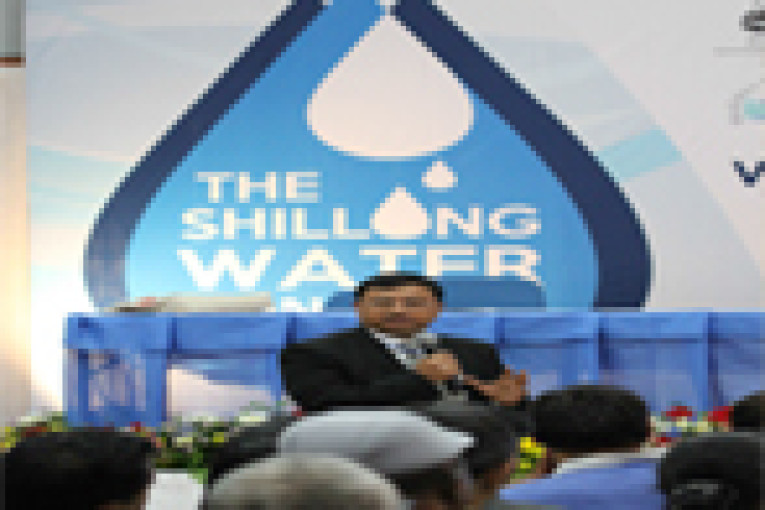
I. INTRODUCTION
The Shillong Water Conclave was organised by the Meghalaya Water Foundation along with the Government of Meghalaya, the India Water Foundation, GIZ-CCA-NER and ICIMOD at the convention hall of NEHU, Shillong on 22 March 2014 to discuss Water Equity & ustainability in the Context of North East India. The detailed programme schedule is placed in Annexure I. The basic purpose of the conclave was to provide a platform for discourse to address the challenges for evolving ways and means to become water secure while being equitable and sustainable. The conclave endeavoured to bring all the stakeholders on a single platform.
II. INAUGURAL SESSION
The welcome address was delivered by Shri Pharang Roy, Chairman Meghalaya Water Foundation. He enumerated effect of climate change and its effect on society.
In his opening remarks Prof P. Shukla, Vice Chancellor, NEHU, pointed out some of the water related issues being faced in the campus of NEHU and hoped that this conclave will be able to address all major issues facing the region.
Delivering the Key Note Address Shri Mihir Shah, Member Planning Commission Government of India, emphasized that Water is too complex to be managed by government alone and a multi disciplinary and participatory approach involving all stake holders is required. . It should be mandatory for drinking water projects both urban and rural to have a sanitation component. It should be mandatory to have a water audit. There was a need for legal changes in governances of water it should be a public trust document
Dr. K.K. Paul, Governor Meghalaya also addressed the gathering and indicated that that this convention was being held at the most appropriate time as there was an urgent need to look into all aspects of water use and timely action was required to address the present ill of water management.
III. PROGRAMME DESIGN
The programmed was built around three working sessions (Groups) organised around the following three questions.
a) Working Group 1: The Challenges of Working Together
Facilitator Mr. Aiban Swer, Director, Meghalaya Institute of Enterprises
Members:
- Shri Mihir Shah, Member Planning Commission, Govt. Of India
- Shri K.S. Kropha, IAS, Addl Chief Secretary, Govt of Meghalaya
- Shri Balajied Singh Syem, Syem of Hima Khyrim
- Shri Teilinima S. Thangkhiwe, Chairperson, Khasi Hills Autonomous District Council(KHADC)
- Ms Darlin Syiem Chairperson North East Network
b) Working Group 2: Who would be the Change Makers
Facilitator:
Shri Rathin Roy, Director, National Institute of Public Finance and Policy
- Shri Pharang Roy, Chairman Meghalaya Water Foundation
- Shri Toki Blah, Chairman Informed Conscious and Responsible Existence (ICARE)
- Shri K. N. Kumar IAS, Principal Secretary, Community & Rural Development, Government of Meghalaya.
- Ms Farida Warjri, Board Member, North East Network
- Shri David Laiphlang, President, Shillong Press Club.
c) Working Group 3: Technology as if people mattered
Facilitator: Shri Kenneth Pala, Regional Coordinator, GIZ
- Prof B.K. Tewari, Head, Department of Environmental Studies, North Eastern Hill University, Shillong.
- Mr. David Molden
- Shri Arvind Kumar, President India Water Foundation
- Shri Carmo Naronha, CEO Bethany Society(NGO), Shillong
- Ms Aye Chellie
IV. CONCLUDING SESSION
The representative of the three working groups made their presentation and depending on their suggestion/recommendations the Shilling Water Declaration was drafted and was presented by Shri Aiban Swer, CEO Meghalaya Water Foundation and was accepted by the house.
The finalized declaration is reproduced below.
The Shillong Water Declaration
On the occasion of World Water Day, 22nd March, 2014 we the participants of the Shillong Water Conclave give our wholehearted support to the strategic thrust of the 12th Five Year Plan on water and sanitation especially its determination to bring about a more sustainable, more inclusive, more participatory, and more people/community centered paradigm in the management of the water resources of India, recognizing the common pool resource character of water.
We are also pleased and excited that the draft Water Policy of Meghalaya is a shining example of what could be attempted at the state level through a genuinely consultative process. We appreciate the Honorable Governor’s statement that big macro projects must also be sensitive to likely adverse impact on the environment and other unintended consequences, especially given the ecologically fragile nature of the young Himalayas.
We believe that the Meghalaya’s basin based approach to development is a wise and strategic step to break silos, bridge the gap between the created and the utilized capacities of Government initiatives. We, however, reiterate that it must be ensured that the governance of this approach must be genuinely participatory, inclusive and fully respectful of local knowledge holders and perspectives. This is the only way in which sustainable solutions can be found to the increasingly common conflicts between upstream and downstream people within watersheds in Meghalaya
Given the increasingly important role of groundwater and the exciting possibilities opened up by the National Aquifer management programmed initiated in the 12th plan, we believe that we need to create a Meghalaya Ground Water Authority. The Meghalaya Ground Water Authority should involve the entire range of stakeholders in the Sustainable management of the ground water resources of the state. Special emphasis must be placed on developing barefoot hydrogeologists as proposed in the 12th Plan, which is in line with the pioneering efforts of the State of Meghalaya’s Barefoot Environmental Educators (BEEs) initiative. The State needs to enact a Groundwater Law which makes a complete departure from British common law and adopts a Public Trust Doctrine enunciated by the Supreme Court of India
We would also like the Government of Meghalaya to follow the example of the Government of Sikkim in developing an Atlas of the Springs of Meghalaya and protect the catchment areas of these springs utilizing the opportunities opened up by the new Operational Guidelines of the Mahatma Gandhi National Rural Employment Guarantee Act.
We strongly believe that the paradigm shift proposed in the Meghalaya State Water Policy requires intensive and on going capacity building of all relevant stakeholders which must be based on a consortium approach involving partnerships with academia, civil society, technical research institutions and local communities.
Acknowledging that 75% of all communicable diseases are water bourne we reiterate that safe drinking water and sanitation are crucial for a healthy and dignified life. We will all support the Government of Meghalaya in this initiative and the habitation saturation approach advocated in the 12th Plan. We fully support the attempts to link water and waste management in urban areas.
Concern about the destruction of our lands and landscapes by irresponsible development of extractive industries in the North-East, we fully support the planning Commission’s attempt to introduce a system of water audits of industries in consultation with all stakeholders in order to reduce the water footprint over time.
Taking note of the high water requirement of intensive agriculture, we urge the Governments of the North-East to take a closer look at the Ecological assets and balance the use of water through a more sustainable and local ecological agriculture that is consistent with the knowledge and needs of the local communities. We urge the Government of Meghalaya to firmly reject the earlier Jhum control program and continue with its recent initiative of Jhum improvement by ensuring that the Jhum cycles have a sustainable character.
We also support the 12th Plan proposal on a community based transparent and participatory approach to pricing of water in the form of fees charged by local Water Associations/Committees for irrigation. In the case of domestic water we believe that a progressive pricing system should kick in after the provision of basic lifeline water provided free of charge to every citizen.
We are deeply concerned that the laudable principles enunciated in the Meghalaya Water Policy draft should not be merely reduced to tokenism but be backed by specific instruments of policy that enable the translation of these principles into enduring outcomes on the ground for the people of Meghalaya. Following the lead of the 12th 5-year plan, the state government should incentivize communities to move towards a paradigm shift enunciated in the Meghalaya State Water Policy. This includes in centivization of a more active and informed participation by women in every water project, right from initiation to project completion and going on to post project maintenance and social audit.
Each element in the Meghalaya State Water Policy must be backed by the provision of adequate funding leveraging the enormous resources being made available by the Government of India through its centrally sponsored schemes such as MGNREGA, IWMP, RRR and, Command Area Development Program.

